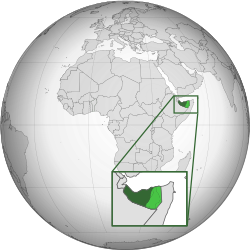Somaliland
Somaliland (Somali: Somaliland; Arabic: صوماليلاند Ṣūmālīlānd, أرض الصومال Arḍ aṣ-Ṣūmāl), officially the Republic of Somaliland (Somali: Jamhuuriyadda Somaliland, Arabic: جمهورية صوماليلاند is a de facto country that used to be the former protectorate of British Somaliland. Djibouti lies to the west of Somaliland, the Federal Republic of Ethiopia lies to the south and west and Somalia lies to the east and south.[11][12]
Republic of Somaliland | |
|---|---|
| Motto: لا إله إلا الله محمد رسول الله (Arabic) Lā ilāhā illā-llāhu; muhammadun rasūlu-llāh "There is no god but God; Muhammad is the Messenger of God" | |
| Anthem: حياة طويلة مع السلام Long life with peace | |
 Controlled territory (dark green) and territory claimed but not controlled (light green) | |
| Capital and largest city | Hargeisa 9°33′N 44°03′E / 9.550°N 44.050°E |
| Official languages | Somali arabic |
| Second language | Arabic,[3] English |
| Ethnic groups (2017[4]) | 99% Somali: |
| Demonym(s) | Somali;[5][6]
Somalilander |
| Government | Unitary presidential republic |
| Muse Bihi Abdi | |
| Abdirahman Saylici | |
| Abdirisak Khalif[7][8] | |
| Adan Haji Ali | |
| Legislature | Parliament |
| House of Elders | |
| House of Representatives | |
| Unrecognised independence from Somalia | |
| c. 2500 BCE | |
| 1185 | |
| 1750–1884 | |
• Establishment of British protectorate | 1884 |
• Independence of the State of Somaliland | 26 June 1960 |
• Union with the Trust Territory of Somaliland | 1 July 1960 |
| 18 May 1991 | |
| Area | |
• Total | 177,000[9] km2 (68,000 sq mi) |
| Population | |
• 2021 estimate | 5.7 million[9] (113th) |
• Density | 28.27[9]/km2 (73.2/sq mi) |
| GDP (PPP) | 2018 estimate |
• Total | $2.5 billion[10] |
• Per capita | $675[9] |
| Currency | Somaliland shilling |
| Time zone | UTC+3 (EAT) |
| Date format | d/m/yy (AD) |
| Driving side | right |
| Calling code | +252 (Somalia) |
The area used to be the Somaliland protectorate, which was part of the British empire along with Jubaland, once called Trans-juba. The British granted its independence on 26 June 1960 upon which it called the "Somaliland Republic".[13] Shortly after, the leaders of Somaliland and Somalia agreed to form a unified state. In May of 1991, after a brutal war waged by the government of Siad Barre, Somaliland proclaimed and regained its independence.
Currently, Somaliland's international position fulfills the requirements to be considered an independent country[14] according to the Montevideo Convention. The government of Somalia, however, still considers Somaliland to be a part of Somalia.
Somaliland has a republican government with free elections. The capital is Hargeisa. Berbera is a beautiful city on the coast. About 55% of the people of Somalilands are nomads.[15] Most Somalis are Sunni Muslims. Some people are part of Sufi orders.
A territory in the west, called Khatumo State has been disputed between Somaliland and Puntland.
Demographics change
Language change
Most people in Somaliland speak Somali and Arabic. Article 6 of the Constitution of 2001 says the official language of Somaliland is Somali,[13] but Arabic is a mandatory subject in school. English is also spoken and taught in schools.
The main Somali dialect is Standard Somali. Standard Somali is spoken in most of Somalia and in countries that are next to it. Standard Somali is used by almost all of the media in the Somaliland region.
Religion change
Almost all Somalilanders are Muslims.[16] This is because Islam is the state religion, and promoting a religion other than Islam is against the law.[13] Small amounts of non-Islamic traditions exist in Somaliland, but Islam is very important to the Somali sense of national identity.
References change
- ↑ "Somaliland Constitution". www.somalilandlaw.com.
- ↑ Somaliland Official Gazette [1] Archived 20 April 2016 at the Wayback Machine
- ↑ website, Somallilandlaw.com – an independent non-for-profit. "Somaliland Constitution". www.somalilandlaw.com. Retrieved 2017-07-02.
- ↑ "A look at Somaliland between clan politics, regional turmoil and November elections". New Internationalist. 2017-10-01. Retrieved 2021-07-12.
- ↑ "Somalia". World Factbook. Central Intelligence Agency. 14 May 2009. Retrieved 31 May 2009.
- ↑ Paul Dickson, Labels for locals: what to call people from Abilene to Zimbabwe, (Merriam-Webster: 1997), p.175.
- ↑ "Somaliland parliament elects Abdirisak khalif as new speaker". 3 August 2021.
- ↑ "Golaha Wakiilada Somaliland oo doortay guddoomiye".
- ↑ 9.0 9.1 9.2 9.3 "Republic of Somaliland - Country Profile 2021" (PDF). March 2021.
- ↑ "The Somaliland Health and Demographic Survey 2020". Central Statistics Department, Ministry of Planning and National Development, Somaliland Government: 35.
- ↑ "Somaliland Official Website". somalilandgov.com. Archived from the original on 14 February 2012. Retrieved 23 December 2010.
- ↑ Hoehne, Markus Virgil. "The rupture of territoriality and the diminishing relevance of cross‐cutting ties in Somalia after 1990." Development and Change 47.6 (2016): 1379-1411.
- ↑ 13.0 13.1 13.2 "THE CONSTITUTION OF THE REPUBLIC OF SOMALILAND" (PDF). International relations and security network. 31 May 2001. Archived from the original (PDF) on 27 February 2012. Retrieved 23 December 2010.
- ↑ Lacey, Marc (5 June 2006). "The Signs Say Somaliland, but the World Says Somalia". The New York Times. Retrieved 25 December 2010.
- ↑ "Our Country – Somaliland Official Government Website". Retrieved 2020-12-30.
- ↑ "Background Note: Somalia". U.S Department of State. Retrieved 23 December 2010.

